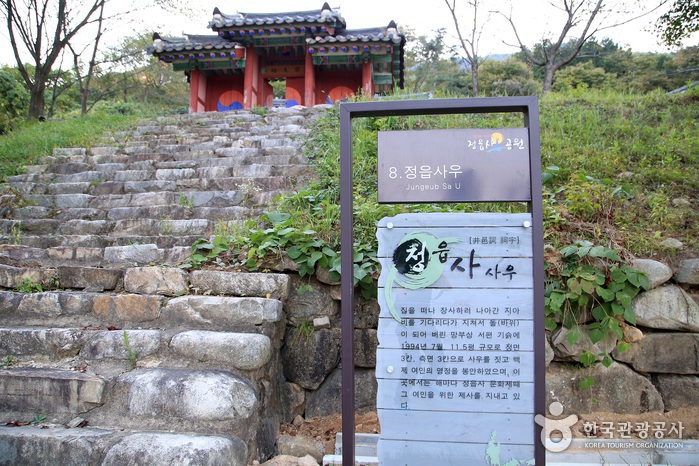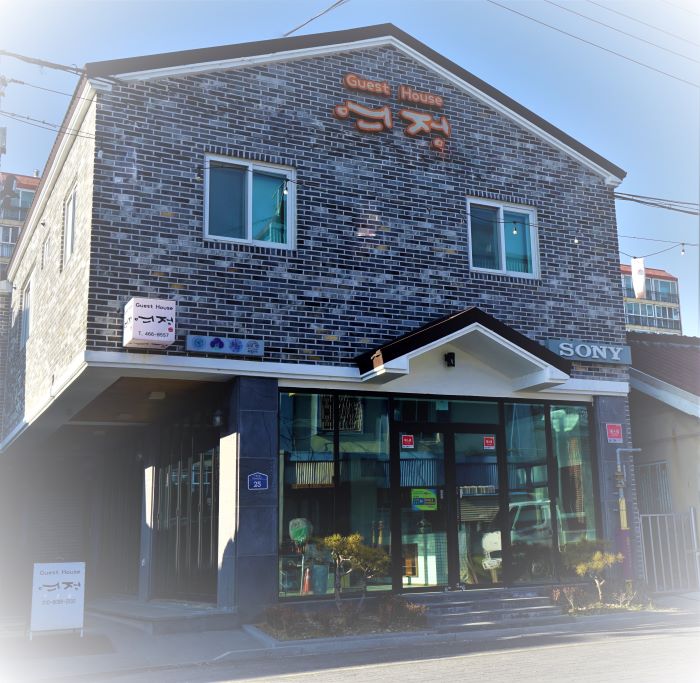Jeongeupsa Culture Park (정읍사문화공원)
Jeongeupsa Culture Park (정읍사문화공원)
 – Homepage
– Homepage
culture.jeongeup.go.kr (Korean, English, Japanese, Chinese)
– Tel
+82-63-539-6776
Jeongeupsa Culture Park (located in Sigi 3-dong in downtown Jeongeup-si) was built in honor of ‘Jeongeupsa’ a famous Baekje Gayo (a type of poem from the Baekje dynasty). Jeongeupsa is the only poem of the five Baekje Gayos (Jeongeupsa, Mudeungsangok, Bangdeungsangok, Seonunsangok, and Jirisangok) recorded in Hangeul that remains in existence today.
The park, built on the location where the epic poem took place, boasts a 2.5-meter high granite statue of the heroine of Jeongeupsa. Nearby the statue are a shrine and a 2-meter wide monument commemorating the poem. Located in the vicinity are the Jeongeupsa Art Center, the Korean Classical Music Center, the city library, and an outdoor stage.
– Address : Sigi-dong, Jeongeup-si, Jeonbuk-do
※ Presentation Information
– Information and Guides
• 1330 Travel Hotline: +82-2-1330
(Korean, English, Japanese, Chinese)
• For more info: +82-63-539-6776
– Parking
Available
– Day Off
N/A (Open all year round)
– Operating Hours
Open 24 hrs
– Restrooms
Available










◎ Nearby Tourism Infobox
⊙ Jeongeup Ssanghwacha Street (정읍 쌍화차거리)
– Homepage
www.jeongeup.go.kr
This unique street, known for its cafés selling ssanghwacha, is located along Jungang 1-gil, which is about 200 meters from Jeonbuk Jeongeup Police Station, right in the heart of downtown Jeongeup. Ssanghwacha is a traditional Korean tea made by brewing ssanghwatang, an herbal concoction that includes ingredients like white woodland peony, Chinese foxglove, angelica root, cinnamon, and licorice. Often, to cater to personal tastes, nuts such as walnuts and pine nuts, along with egg yolk, are added to the brew. This tea is particularly favored by middle-aged Koreans and is commonly consumed for its restorative properties when one is suffering from a cold or feeling run-down. The flavor is distinctively herbal with a bitter edge and a sweet finish. At the street’s entrance, a sculpture featuring a ssanghwacha teapot offers a warm welcome to visitors. The renowned Ssanghwatang Teahouse, with a history spanning over 30 years, remains a strong presence on this street, accompanied by about ten other large and small teahouses specializing in ssanghwatang. These cafés typically serve traditional Korean desserts like garaetteok (rice cake stick) and nurungji (scorched rice), which complement the herbal tea perfectly.

![Top Cloud Hotel [Korea Quality] 탑클라우드호텔 군산[한국관광 품질인증]](https://ktrip.blogsailing.com/wp-content/uploads/2025/11/2949296_image2_1.jpg)

![Save Zone – Jeonju Core Branch [Tax Refund Shop] (세이브존 전주코아점)](https://ktrip.blogsailing.com/wp-content/uploads/2025/11/2886363_image2_1.jpg)
![Olive Young – Jungang Jeonju Branch [Tax Refund Shop] (올리브영 전주중앙)](https://ktrip.blogsailing.com/wp-content/uploads/2025/11/2886372_image2_1.jpg)
![Himart – Gyeongam Branch [Tax Refund Shop] (하이마트 경암점)](https://ktrip.blogsailing.com/wp-content/uploads/2025/11/2890012_image2_1-768x576.jpg)
One Comment